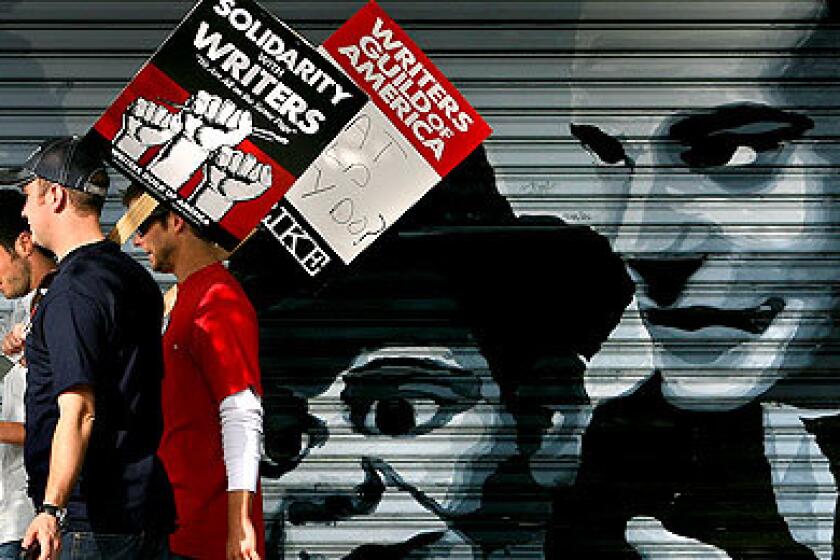WGA says it won’t seek a strike vote during coronavirus crisis

The Writers Guild of America, which many in Hollywood believed would strike this year, has been trying to reach an extension of its contract with film and television studios after the COVID-19 pandemic prevented in-person meetings.
Talks between the two groups, which usually involve as many as 100 people or more, were scheduled to begin Monday at the Sherman Oaks offices of the Alliance of Motion Picture and Television Producers.
What does the coronavirus crisis mean for a potential Hollywood writers strike? The pandemic makes the prospect of a walkout less likely, experts say.
However, such a large meeting was not possible because of new statewide rules on social distancing intended to reduce the spread of the virus.
Instead, some exchanges via phone or email have taken place in recent days, said people familiar with the communications who were not authorized to comment.
In an email to members on Tuesday, the union’s leaders said it could not “effectively negotiate this important three-year agreement in our usual fashion” and that it may not be possible to bargain a new three-year contract by the May 1 deadline. But members could continue to work under the existing 2017 agreement and the union would not be asking for strike authorization “in the interim,” the email stated.
WGA leaders said they were discussing several options with the companies, including a potential contract extension, but added: “This is not a time for rash decisions or pressured outcomes. Instead we are conferring with public health authorities, financial analysts, other guilds and unions, legislators, benefit fund experts and others to gather information as the situation continues to evolve.”
The WGA, a 10,000-member union, has asked the studios to extend the contract to Sept. 1, giving the sides more time to bargain at a time when production has shut down, people familiar with the matter said.
“Nothing has been worked out as yet,” WGA spokesman Neal Sacharow said. “The WGA is evaluating the situation.”
The producers’ alliance, however, favors an earlier end to a contract extension — by June 30 — in order to avoid creating further uncertainty in the industry already roiled by the coronavirus outbreak. The contract for Hollywood’s largest union, SAG-AFTRA, also expires June 30.
“When this coronavirus passes, and work can resume, it’s critical that those who make a living in industry know that there will be no further disruptions of their ability to make a living,” said a person close to the AMPTP who was not authorized to comment. “A critical component in doing so is having agreements in place with all unions in industry. We call on the WGA to work together to achieve that goal as soon as possible.”
Some in the industry believe the AMPTP also is concerned that postponing the contract several more months would put the union in a stronger position to strike, if parties can’t agree on terms.
Unlike actors, directors and below-the-line crew members, many writers can still work during the production shutdown.
The producers’ alliance is expected to press the WGA to adopt framework of the deal recently negotiated by the Directors Guild of America, which includes increases in minimum salaries and a nearly 50% increase in residuals for members working on original shows made for subscription video on-demand series.
However, the WGA is looking to improve on terms of the DGA agreement and has issues unique to its members that need to be negotiated.
Until just a few weeks ago, film and television business executives had been making contingency plans to prepare for a possible strike by writers, which would be the first walkout since the 2007-08 strike that lasted 100 days.
Now, the focus has shifted to shutting down or canceling productions and focusing instead on development until restrictions on gatherings are lifted.
The pandemic has created new worries for writers and other industry workers, thousands of whom have suddenly lost their jobs. Studios and other companies are facing massive financial losses.
The WGA talks would be followed by similar talks with SAG-AFTRA, which has also held informal talks with AMPTP and has not asked for an extension of its contract, said one person close to the talks who was not authorized to comment.
More to Read
Inside the business of entertainment
The Wide Shot brings you news, analysis and insights on everything from streaming wars to production — and what it all means for the future.
You may occasionally receive promotional content from the Los Angeles Times.













